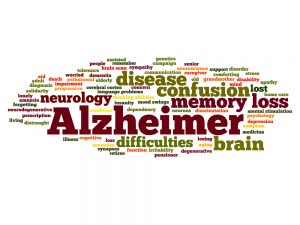How to Talk to Someone with Alzheimer’s Disease

Have you ever tried to talk to someone with Alzheimer’s disease and ended up feeling awkward or frustrated? Communicating with someone with Alzheimer’s disease can be challenging especially if the diseases has progressed to advanced stages.
Alzheimer’s disease usually attacks the brain in a way that it makes it difficult for the affected person to communicate effectively as well as remember past events. This is challenging especially for caregivers because they have to adjust the way they communicate to their loved ones. The good news is that there are effective ways for dementia caregivers to communicate with loved ones impacted by this disease, as discussed below.
1. Understand the disease.
The most important thing one must do to communicate effectively with an Alzheimer’s patient is to understand the disease. The more information you have about this disease, the more effective you will be able to communicate with the Alzheimer’s patient. As Alzheimer’s progresses, difficulties in speech and memory will become more pronounced. The patient will start to rely more heavily on familiar words.
 To communicate effectively, you need to invent new words that are easy to grasp. A study conducted by the Alzheimer’s Association revealed that many Alzheimer’s patients usually revert back to their native language. This means that if the patient speaks English but his/her native language is Spanish, then he/she will be more comfortable communicating in Spanish. By understanding Alzheimer’s disease, you will know how to communicate with your loved one from early stages of the disease to advanced stages.
To communicate effectively, you need to invent new words that are easy to grasp. A study conducted by the Alzheimer’s Association revealed that many Alzheimer’s patients usually revert back to their native language. This means that if the patient speaks English but his/her native language is Spanish, then he/she will be more comfortable communicating in Spanish. By understanding Alzheimer’s disease, you will know how to communicate with your loved one from early stages of the disease to advanced stages.
2. Limit distractions.
Background noise from things like radios, television or even a rotating fan can easily distract an Alzheimer’s patient when communicating. Try to limit the number of distractions by turning off anything that may hinder smooth communication.
Find a quiet place where the two of you can focus on each other and communicate in peace. The conversation should be between two people. If more people are involved in the discussion, then the patient will be distracted, affecting his/her ability to communicate. Keep the conversion one-on-one. Adding even a single person into the discussion can make your loved one anxious and confused.
3. Maintain eye contact.
Throughout the conversation, maintain eye contact with your loved one. If your loved one is communicating while seated, follow suit and sit nearby instead of speaking down or looming above him/her. The Alzheimer’s Foundation of America suggests that you should establish friendly eye contact when speaking to your loved one who has Alzheimer’s. Eye contact is very important because it assures the person that he/she has your full attention.
4. Enter into their world.
You have to temporarily enter into the world of the person suffering from Alzheimer’s disease in order to establish a meaningful conversation. The world of Alzheimer’s patients is totally different from the real world. The Fisher Center for Alzheimer’s Research refers this concept as “reality therapy.”

Depending on the stage of the disease that the patient is in, he/she may believe in strange things like he/she as won a jackpot or he/she is an accomplished singer. You will not lose anything if you temporarily live in the world of your loved one suffering from Alzheimer’s. It is best to play along with what the patient currently believes.
Remember that the mind of your loved one has been hijacked by Alzheimer’s disease and no amount of effort or persuasion will convince him/her otherwise. Entering into their world will help to brighten their moods as well as ease his/her anxiety.
5. Keep the conversation simple.
Before telling your loved one with Alzheimer’s a story, just consider how confusing the story may sound. It is therefore very important to always speak slowly and in short sentences. Limit the conversation to precise and direct sentences.
If you want to show someone with Alzheimer’s something, be specific. For example, say, “Here is your jacket,” instead of saying, “Here it is.” Avoid using vague and confusing statements. Also avoid using phrases like, “Try to remember,” or “I just told you,” because these types of phrases will make your loved one feel bad about his/her inability to remember cert
ain things, places or people. The conversation and comments should be kept simple, short and straight to the point.
6. Be patient.
Sometimes you can feel frustrated talking to your Alzheimer’s patient because of his inability to remember things that you think are basic and simple to remember. Alzheimer’s patients are more likely not to recall certain things, regardless of how basic or simple they appear. You need to be patient because the person suffering from Alzheimer’s is not doing it intentionally in order to frustrate you. Be patient with your loved one and try to help him/her as much as you can.
7. Avoid conflicts.
Never argue with your loved one who has Alzheimer’s because you will make the person more agitated. Try as much as possible to avoid making comments that are inflammatory such as, “You are wrong, or “You have done it again.” Even if you are frustrated, be kind, calm and supportive.
In conclusion, from the discussion above, it is clear that talking to someone with Alzheimer’s is possible regardless of the stage of the disease. However, patience and support are the keys to helping you communicate effectively.
Do you find yourself losing patience with your loved one with Alzheimer’s? Are you feeling overwhelmed and exhausted? Releasing subconscious barriers cannot only help you be the best version of you in that relationship, but can also help you find balance, ease and more time for you. Interested? Learn more about how we can help you do this with the Body Code, and contact Dr. Tina for a 20 minute complimentary call.
This article was written by Meredith Rogers who is a registered nurse, blogger and a public health advocate. She has been raising awareness about Alzheimer’s Disease for nearly a decade now. Her blog GeriatricNursing.org focuses on various aspects of aging and nursing care. Learn how to spot the early warning signs, and learn about the risk factors of Alzheimer’s in her article Alzheimer’s Disease-Time to Take a Closer Look here.



